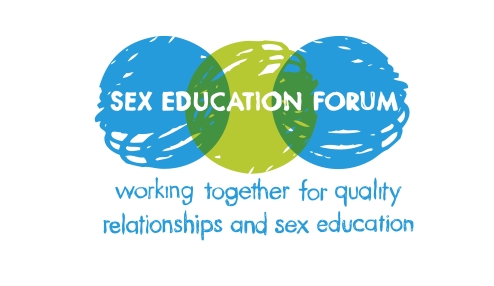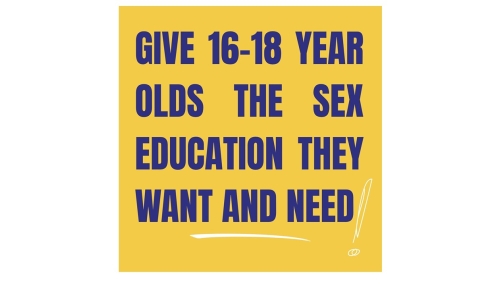PRESS RELEASE - 1 FEBRUARY 2022
New poll reveals the shocking gaps in the provision of Relationships and Sex Education lessons
A major new survey by the Sex Education Forum shows that young people are still not receiving the comprehensive and quality Relationships and Sex Education (RSE) they were promised when the subject became mandatory over 18 months ago.
The survey comes amid growing concerns about the prevalence of sexual harassment in schools, with a 2021 report by Ofsted warning that nearly 90% of girls, and nearly 50% of boys, said being sent explicit pictures or videos of things they did not want to see happens a lot or sometimes to them or their peers.
Despite this, the survey, commissioned by the Sex Education Forum which represents a broad coalition of organisations linked to the delivery of RSE, has shown over a third (37%) of young people have learned nothing about ‘power imbalances in relationships’, and almost three in ten (29%) learned nothing about how to recognise grooming for sexual exploitation.
Legislation making RSE statutory in all schools in secondary schools and Relationships Education statutory in all primary schools in England came into effect in September 2020 and was expected to be followed in full since September 2021.
Disruption due to COVID-19 has impacted the delivery of RSE over the last two years but training and long-term funding is urgently needed by the UK Government to support teachers to deliver RSE.
The survey of 1,002 young people aged 16-17 in England has uncovered the extent to which lessons are being inconsistently delivered, often with few opportunities for pupils to even ask questions or influence how RSE lessons can be improved.
Basics are still not being covered in lessons
Schools are expected to follow statutory RSE guidance issued by the Department for Education in 2019, which sets out a range of topics. However, many young people report still not receiving the basic information they need about mandatory topics, such as how to recognise healthy relationships (28%). This includes four in ten (40%) of young people saying they learned nothing about FGM.
Despite young people under 25 experiencing the highest rate of unplanned pregnancy and accounting for the highest rates of new STI diagnoses in England, nearly half of all new cases of sexually transmitted infections in England, one in three (33%) said they didn’t learn about how to access local sexual health services.
The topic least likely to be discussed was sexual pleasure, with 46% of young people reporting they learned nothing about this.
There is good news in that the traditional topics of RSE, including puberty, pregnancy, and condoms, are among some of the most likely to be discussed in RSE lessons with schools getting the scientific element of RSE right. There had also been some improvements in consent being taught, compared to the 2019 polling.
However, the broader picture is that topics more associated with healthy relationships and the realities of young people’s lives still do not have parity with the more biological aspects of RSE.
The quality of lessons fails to improve
Compared to findings from a survey commissioned by the Sex Education Forum in 2019, there has been no overall improvement in the quality of RSE, in fact the latest poll suggests it is getting worse, with the overall quality down 6 percentage points. Just over one-third (35%) of young people rated the quality of their school RSE as ‘good’ or ‘very good', down 6 percentage points on the rating in 2019. More than one in five (22%) rated the quality of RSE as ‘bad’ or ‘very bad’, an increase of 4 percentage points since 2019.
Just one in five young people (20%) said they had an ‘opportunity to ask my questions and get answers’ and only one in seven (14%) recalled ‘being asked my opinion about how RSE could be improved' over the last year.
RSE is not being discussed at home
The polling has also shone a light on the gap in conversations about RSE at home. For around one in four young people there has been no RSE from parents and carers; with those who did receive some reporting this was in the form of one big talk or a few separate discussions. Only one in six (17%) of the young people surveyed had regular discussions with parents and carers about RSE.
Worryingly, one in five respondents said they do not have any trusted adult with whom they feel comfortable discussing matters relating to relationships and sex. The survey also shows boys are less likely than girls to have a trusted adult to have these types of discussions with. Where young people do have a trusted adult they are a female in over three-quarters (77%) of cases.
Ministers must get a grip on this RSE crisis
There was cross-party support for RSE to be made compulsory in schools, and during hearings in Parliament over five years ago, testimonials were heard by MPs from young people about the poor quality of these lessons.
Urgent attention and investment are now needed to address the lack of progress with delivering the mandatory curriculum and ensuring high-quality RSE for all children and young people. Ministers are being urged to turn this situation around by properly funding RSE training and monitoring progress more closely.
Lucy Emmerson, Chief Executive, Sex Education Forum, said: ‘Relationships and Sex Education lessons became mandatory in all schools because it was the right thing to do after decades of inconsistent delivery of RSE but this new polling shows the extent to which young people are continuing to be failed. Even the basic building blocks of RSE are still being missed and the knock-on effect is young people lacking the skills and knowledge for healthy and respectful relationships.
‘COVID-19 has had a serious disruption to young people’s education and it has worsened the physical and mental health challenges experienced by young people. However, the poor quality of RSE has long been evidenced and yet Ministers have failed to provide schools with adequate funding to develop the skills and confidence of teachers and provide high-quality support for pupils. We know many schools are getting RSE right, but this isn’t the picture nationally, with teachers urging Ministers to get a grip of this situation, we stand with them in demanding action is taken now with proper and long-term investment in training and resources.
‘Young people are clear that they want RSE to be discussed at home, through open and supportive conversations, that better equip them for the challenges they face on a daily basis. Parents and carers are willing but need support to get started.
Today's polling must be a wake-up call to the Government to change course. Without an immediate intervention, we seriously risk letting down another generation of young people.’
Lewis Ruddock, Externals and Press Director, Sexpression:UK, said ‘The results of the poll exemplify what we have long known, young people want and need more RSE. We must listen to young people and tailor RSE to what they find relatable and useful.
‘The introduction of statutory RSE was a huge step, yet it is heavily reliant on quality implementation across England to be a success. Due to the variable support available to schools, young people are still missing out on high-quality comprehensive RSE. With gaps at home, many young people depend on schools for RSE, as such, schools need adequate support to facilitate this. Sexpression:UK fully supports the Sex Education Forum in pushing for relevant measures including training, monitoring and funding to ensure schools are fully equipped to deliver RSE that young people need, want and deserve.’
About Sexpression:UK
Sexpression:UK, a partner of the Sex Education Forum, is a near-peer independent UK charity with the goal of empowering young people to make decisions about relationships and sex by running informal and comprehensive RSE in the community.
About the Sex Education Forum
As the voice of Relationships and Sex Education (RSE) in England we promote and protect the physical and mental health of children and young people by improving their access to RSE.
We bring together our partners and wider stakeholders to share best practice, research, monitor the provision of RSE, explore and respond to new themes and identify gaps. Working together with our partners, members and wider stakeholders is central to everything we do. We support educators with high-quality training, resources and a membership scheme, so they can be competent and confident providers of RSE, in partnership with parents, carers, children and young people.
Email: [email protected]
Tel: 07523 911016
Read the Young People's RSE Poll 2021 report in full
ENDS




Share